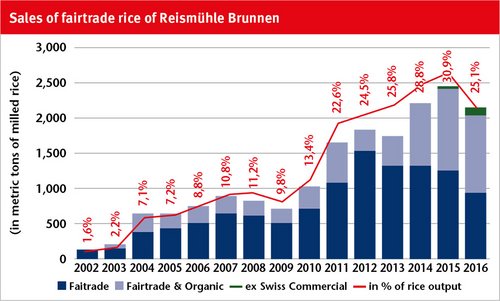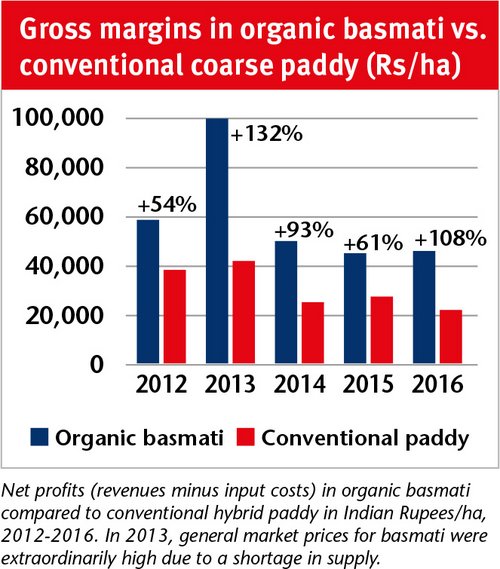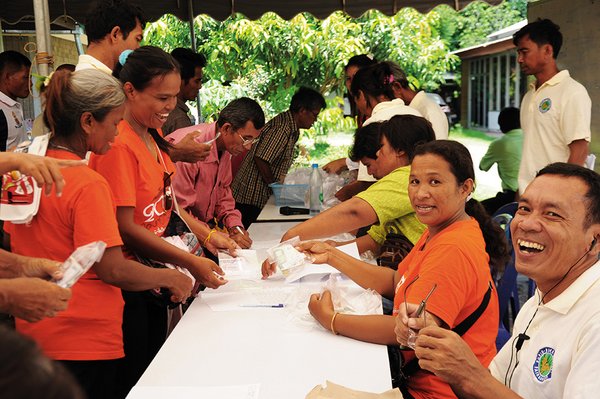 Download this article in magazine layout
Download this article in magazine layout
- Share this article
- Subscribe to our newsletter
The private sector as a driver for sustainable rural development
Coop, the second largest retailer in Switzerland, launched in 2011 an innovative project to support more than 4,500 smallholder rice farmers in Northern India and Eastern Thailand to convert to organic farming and to sell their produce at fair trade conditions. This initiative is part of the company’s strategy to convert its rice brand to fairtrade and organic. Over the past years, Coop’s rice processing and trading company Reismühle Brunnen has continuously increased the share of sustainable rice, and today, it is the largest supplier of organic and fairtrade speciality rice in the European market. Mandated by Coop, the Swiss development organisation Helvetas implements the project in collaboration with its sister organisation Intercooperation Social Development India and with local farmer organisations, processing companies and research institutions. In India, the key partner is the company Nature Bio-Foods Ltd, which buys the paddy directly from the farmers, mills it in their own premises and exports it to Reismühle Brunnen. Under its “Ecolife” brand it also sells rice and other products in the emerging domestic organic market. In Thailand, the main partner is the farmer co-operative Rice Fund Surin, which runs its own rice mill and sells the rice to various clients abroad, but also in the domestic market.
Social and environmental impact as a unique selling proposition
The purpose of the project is to improve the incomes and livelihoods of marginalised smallholders, enhance the environmental performance of the production systems and provide consumers with an attractive product of high quality. For the sustainable basmati project in India the partners therefore chose a remote region (Nainital District in Uttarakhand) located in the foothills of the Himalayan range. Starting with less than 200 pilot farmers in 2011, the project involved more than 4,000 households in almost 100 villages in 2016. Working with large numbers of farmers with very small holdings (average below 1 ha) involves higher transaction costs for extension and transport compared to sourcing from larger farms in the plains. However, it also allows offering consumers a product that has a clear development impact. Since the hill farms do not rely on groundwater for irrigation the selection of a remote area avoids the risk of pesticide residues that are of increasing concern in the Gangetic plain. Farmers in the hill region had traditionally grown some basmati rice, but most of them switched to coarse rice varieties due to a lack of market access. Traditional basmati – similar to jasmine rice in Thailand – has lower yields than coarse rice, but thanks to its unique features (fragrance, long grains), it achieves higher market prices and therefore is an interesting cash crop for farmers.
Further developing the production system
In close collaboration with the extension system managed by the local partners, the project helps farmers to optimise production methods in order to increase yields and profitability as well as reduce water consumption and greenhouse gas emissions. Following a Participatory Technology Development approach, farmers were supported in identifying and testing promising innovations like alternative crop nutrition and pest management practices. Variations of the System of Rice Intensification (see box on page 34) were found to be economically and environmentally viable and are increasingly being adopted by farmers. In addition, the rice farmers are encouraged to further diversify their farms by growing pulses, cereals, vegetables and spices.
The System of Rice Intensification (SRI)
• Single seedlings are transplanted with wider spacing at an early stage
• Alternate wetting and drying instead of continuous flooding
• Mechanic weeding with simple tool
Results
• More sturdy plants with more tillers, higher yield
• Less damage by pests and diseases, less lodging
• Less costs for seeds and weeding
• Reduced water input and greenhouse gas emissions
• Better grain quality, higher milling turnout
Fair & good – for people, planet and business!
The project already achieved significant results at farm level. Lower production costs in organic farming and higher product prices ensure that participating farmers earn substantially more than before. Every year the project collects data from representative samples of organic and conventional farms in order to compare their economic performance. The data in India consistently show that organic farmers gain 50–100 per cent higher net incomes from rice than their conventional peers (see figure below). Since basmati is only grown on 20 per cent of the farmland on average, the increase in overall farm income is just 20–30 per cent. However, farmers started diversifying their cropping patterns, which reduces their vulnerability to weather and market price fluctuations and contributes to a more diverse diet. The farmer organisations and local business partners are increasingly successful in developing organic market chains for alternative crops like vegetables, pulses and spices, particularly in domestic metropolitan areas. In future, this should provide farmers as well as businesses the opportunity to gradually move to higher-value crops and to earn additional income while using the extension and certification systems set up for the rice value chains.

The project enables farmers to increase yields, reduce labour requirements (through farm mechanisation) and improve water management. Capacities of the local organisations have been strengthened with regard to quality management and business planning. In addition to the fairtrade price and organic premium that are paid to the individual farmer, the farmer organisations receive a fixed fairtrade premium to be used for community development. They have invested these funds to improve irrigation infrastructure and agricultural equipment, and to develop new income opportunities like tailoring and small-scale processing. They are hence increasingly taking the role of a development actor striving to improve the livelihoods of farming communities.
An external project evaluation confirmed in 2015 that, thanks to its market-oriented approach, the project has successfully established a system of sustainable production and trade while improving the livelihoods of farmers. The innovative set-up creates a win-win-win situation for farmers, businesses and the environment. Consumers get an attractive product with proven positive impact at production level.
Agreements provide the backbone of the value chain
In line with the fairtrade system, the farmers are organised in producer organisations that democratically elect a Board or Executive Body. In Thailand, the farmers sell their jasmine paddy to their co-operative Rice Fund Surin, of which they are a member. Rice Fund Surin takes care of input supply, certification, processing and marketing. Since the producer organisation in India is not yet in a position institutionally to manage the commercial activities, Nature Bio-Foods signs production contracts with the individual farmers. The company also provides training and technical advice to the farmers, manages the Internal Control System that guarantees the organic integrity of the production and arranges for organic and fairtrade certification by accredited agencies. All partners involved have signed Memorandums of Understanding (MoU) that define objectives, roles and responsibilities, and the pricing system (a guaranteed minimum price and defined premiums on top of the actual market price). Helvetas facilitates these arrangements and supports capacity building and monitoring. The fact that Reismühle Brunnen guarantees the partners to purchase specified minimum volumes for several years is the key reason why all of them are ready to invest in the development of the value chain. At the same time, the MoU protects the investment of the private sector parties by providing them with exclusive purchase and marketing rights for the agreed period.
A viable business model
The project took great care to limit its role to the facilitation of improving capacities and systems, and not to take up functions in the value chain that are needed in the long term. All costs for training, extension, certification, processing and marketing are borne by the local businesses and are integrated into the pricing. This ensures that the local actors will continue the value chain independently once the project ends in December 2017. Motivated by its success, many farmers are eager to join – in India, more than the extension teams are able to cover. One can already observe that conventional farmers are increasingly following the example of their neighbours and adopting organic production techniques. The approach chosen has also proved viable for the co-operatives and companies involved. Their turnovers have grown considerably, which enables them to buy more produce from more farmers. Nature Bio-Foods has become one of the largest companies in organic production in India, sourcing various products from more than 80,000 certified organic farms in 13 States. Reismühle Brunnen have substantially increased their sales of organic and fairtrade rice and continuously widened their client base (see left-hand figure on page 33). Since all involved private sector actors have a vital business interest in thriving farms and value chains, this set-up made it possible to develop viable systems in a relatively short time – and with hardly any public funding.

Challenges and constraints
Despite all these encouraging results, one needs to acknowledge that progress hasn’t always been smooth. It is a tremendous challenge to build viable businesses on very small holdings that operate in a harsh and insecure environment. Agriculture is losing importance in these areas, and many young people are moving out of the sector. Producer organisations struggle to deal with a complex set of tasks because their Boards and executives have limited experience in managing an agribusiness of this size. Since margins in staple food processing and trade are very small, it is difficult to recruit and maintain qualified staff even for the local companies involved. Managerial capacity has therefore often been the most limiting factor for using opportunities to their full potential. Nevertheless, the initiative shows that private sector engagement can be an important driver for sustainable rural development. If set up well, thriving agribusinesses can help smallholders to improve their livelihoods, and offer a perspective for rural youth.
Frank Eyhorn
Senior Advisor Sustainable Agriculture
HELVETAS Swiss Intercooperation
Zurich, Switzerland
frank.eyhorn@helvetas.org
References and further information
- Helvetas rice project description: https://www.helvetas.org/topics/keystone_mandates/rice_project.cfm
- Water productivity project including rice in India: https://www.sustainabilityxchange.info/filesagri/WAPRO_Factssheet_A4c.pdf
- Coop Sustainability Fund: http://www.coop.ch/content/act/en/principles-and-topics/coop-sustainability-fund.html
- Reismuehle Brunnen www.reismuehle.ch
- Nature Bio-Foods Ltd http://naturebiofoods.com/
- Rice Fund Surin http://www.ricefund.com/
- The Organic Business Guide http://www.organicandfair.org/oftcc/Publications/Tools-and-Guides/Organic-Business-Guide-publications.php





Add a comment
Be the First to Comment